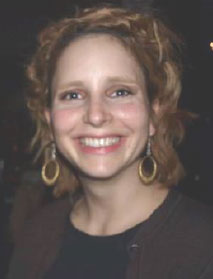Bassersdorf, Switzerland
January 25, 2017

Maria Marin, Scotia Seeds
mariamarin@scotiaseeds.co.uk
Maria is a PhD student at the University of Pavia (Italy) and an early stage researcher in the Marie Curie initial training network NASSTEC (Native Seed Science, Technology and Conservation, http://www.nasstec.eu/). Maria is based at Scotia Seeds (Scotland) and her project is aimed at improving seed quality in large-scale production of native seed.
During the 31st ISTA Congress in Tallinn, Estonia (June 14-21), she gave a poster presentation titled: “Development of tests for seed quality in native seeds used in habitat restoration”. The objectives of the study were to assess seed quality on the EU native seed market, to develop protocols to determine conditions for dormancy breaking and germination and to identify new approaches to seed quality evaluation in native species.
INTERVIEW
Hi Maria,
How and when did you first learn about ISTA?
As soon as I started my post at Scotia Seeds I was introduced to ISTA by my colleagues. ISTA’s International Rules for Seed Testing and working sheets were fundamental to my work.
How is ISTA concretely helping you in your daily job?
I use ISTA’s protocols for seed testing, where available for certain plant families, as a reference for the development of testing protocols for native species.
How do you keep in touch with ISTA work? With ISTA community?
At Scotia Seeds we are subscribed to the ISTA news bulletin Seed Testing International. Recently I have joined the ISTA Flower Seed Testing Committee and I am therefore involved in the committee’s activities and future plans.
Why did you decide to attend the ISTA Congress in Tallinn last June?
I feel that my work is closely related with ISTA’s activities, particularly now that the Association is widening its scope to include native species so I thought that participating to the event was the best way to introduce my work and make valuable contacts. Also, I was very interested in the topics presented at the ISTA Seed Symposium.
What are your main takeaways from this event?
I received great feedback on my work and was pleased to know that native seed science and restoration related topics are starting to be represented within ISTA. It was also very useful to expand my horizons beyond native species and familiarize with the seed industry and seed testing laboratories.
This event gave me also the opportunity to deal with some practical aspects of seed science and to understand the importance of applied research, while also creating a network of valuable contacts.
Were you able to make some useful connections for your work during the Congress?
Yes! I had the pleasure to meet different people and establish fruitful relationships for the future.
Would you recommend students and young researchers to attend similar events?
Sure, I think that it is very important for young researchers to get involved with ISTA and participate to these events in order to understand the needs of the field they are working in and share their findings with stakeholders.
How does it feel to be part of an ISTA Technical Committee?
I have recently joined the ISTA Flower Seed Testing Committee and I am very enthusiastic about it. I feel privileged to have joined this working group and hope to make valuable contributions to it.
If ISTA should change/improve one thing, what would it be?
If not yet in place I would suggest to establish a fund to allow students to participate to ISTA events.
What is your vision for future in seed testing?
Currently there is a lack of knowledge on native seed testing and there is no established route for access to this knowledge for producers. Therefore, future work should focus on developing standardised seed testing methods for native species and delivering them to seed producers.
How about your own future?
I am focused on delivering the requirements for my PhD and NASSTEC project, while also beginning to imagine the future beyond it.
Maria, one last word?
It was great taking part to the ISTA Seed Symposium, thank you! I am looking forward to the next event!